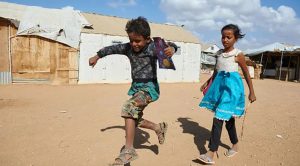
NORRAG’s work in EiE began before its publication of NORRAG Special Issue 02: Data collection and evidence building to support Education in Emergencies and its key role in the 2019 EiE Data Summit in Geneva. This conference, which was co-hosted by INEE, the Swiss Development Cooperation Agency and USAID, resulted in the EiE Data & Evidence Action Agenda, calling for improvements in quality, fit for purpose, and actionable data. This call has been supported by NORRAG and its partners, and heeded by the broaders EiE community and funders, so we have made tremendous progress in data collection and evidence use, leading to action on the ground.
We have moved far since that 2019 conference. But the complexity, number and duration of emergencies has also increased, as have the stressors that exacerbate these shocks (climate change, authoritarianism, and more).
The 2023 conference co-convened by NORRAG with ECW, the Geneva Global Hub for Education in Emergencies, Global Affairs Canada, IRC, UK FCDO, UNESCO and UNHCR and hosted at the Geneva Graduate Institute was an important moment to take stock of the enormous progress that has been made and also to recognise the ongoing challenges. We also sought to further strengthen our collective capacity as actors involved in data collection and analysis, building flexible systems and new modes of respectful collaboration, particularly with the Global South, while acknowledging the non-neutrality of data collection, analysis and use. We continue to collectively identify trends, mechanisms and challenges, as well as establishing pathways and action planning for future success, including in the next Action Agenda for data and evidence in EiE, with a commitment to ethics and knowledge equity in data collection and analysis and evidence generation and uptake.
We still need to reiterate the importance of education in emergency situations for learners and teachers, and also its multifaceted complexity. And at the same time, we need to strengthen national education systems so that learners and teachers can be better integrated into those systems in order to realise their right to education and more. Our work seeks to do that through supporting impactful, useful, relevant, coherent data and evidence, for learning, for resilience, for knowledge equity, through ethical and equal partnerships.